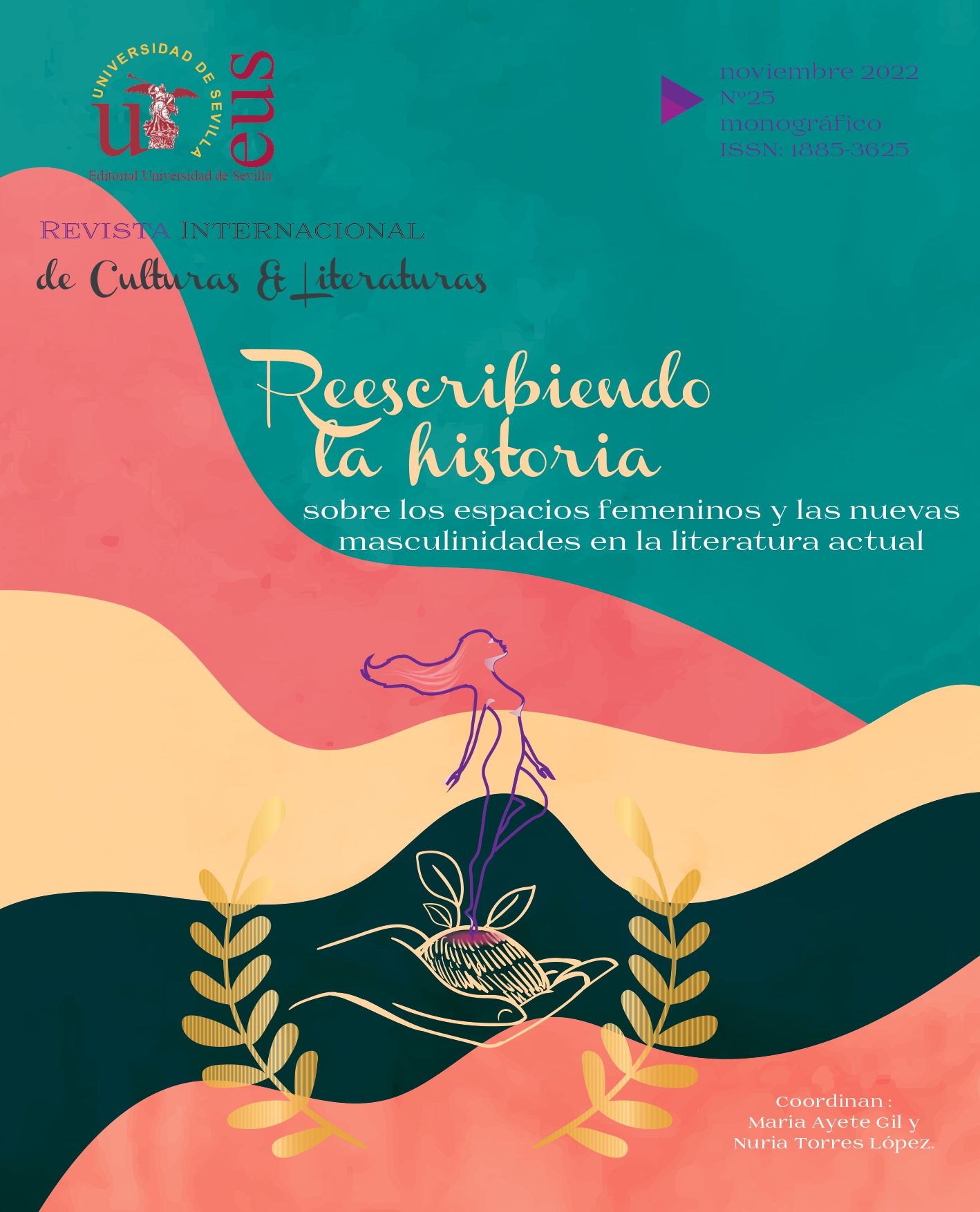“A real fucking man”: explorando masculinidades migrantes en Men without bliss de Rigoberto González desde una perspectiva ectópica
DOI:
https://doi.org/10.12795/RICL2022.i25.23Palabras clave:
Rigoberto González, Men without bliss, masculinities, ectopic literatureResumen
Este artículo introduce la obra del autor mexicano-estadounidense Rigoberto González en el panorama literario español y se centra en su colección de cuentos Men Without Bliss. Para un análisis exhaustivo de su obra, se partirá del marco teórico establecido por Tomás Albaladejo (2011) y su definición de "literatura ectópica" que proporciona herramientas para estudiar los procesos migratorios a través de las obras literarias. Tal y como se ha presentado en otros estudios que abordan este trasfondo teórico, destacaremos la relación entre género y migración. Una lectura detallada de Men without bliss pretende confirmar las huellas de la literatura ectópica en su colección de relato breve. La forma en el que aparece la migración en los cuentos de González, y en particular el modo en que los hombres experimentan los procesos de desplazamiento, son los principales objetivos de este trabajo. Al explorar esta colección de cuentos, nos centramos, además, en el concepto de interseccionalidad y demostramos cómo González representa la "masculinidad tradicional" y el patriarcado como fuente de infelicidad.
Descargas
Citas
Albaladejo-Mayordomo, Tomás. (2011). Sobre la literatura ectópica. In Bieniec, A., Lengl, S., Okou, S., & Shchyhlevska, N. (Eds.), Rem tene, verba sequentur! Gelebte Interkulturalität: Festschrift zum 65. Geburtstag des Wissenschaftlers und Dichters Carmine/Gino Chiellino. (p. 141-154). Thelem.
Alfaro-Amieiro, Margarita. (2016) Ectopic literature. Ectopic literature: the emergence of a new transnational literary space in Europe in the works of Eva Almassy and Rouja Lazarova In Averis, Kate & Hollis-Touré Isabel, Exiles, travellers and vagabonds rethinking mobility in francophone women's writing. (pp. 232-248). University of Wales Press.
American Writers Museum. (2009, January 9). My America: Rigoberto González. Americans Writers Museum. https://americanwritersmuseum.org/my-america-rigoberto-González/
Bayraktar, Nilgun. (2015). Mobility and Migration in Film and Moving Image Art. Taylor & Francis.
Brah, A., & Phoenix, A. (2004). Ain’t I A woman? Revisiting intersectionality. Journal of international women's studies, 5(3), 75-86.
Barker, G. (2005). Dying to be men: Youth, masculinity and social exclusion. Routledge.
Butler, Judith. (1999). Gender Trouble: Feminism and the Subversion of Identity. Routledge.
Camacho, Edna-Elizabeth. (2014). The construction and performance of masculinity through the voice of Mexican American male authors: Arturo Islas’ ‘The Rain God’ and Rigoberto González’s ‘Men Without Bliss’ [M.A.]. https://www.proquest.com/docview/1560676430/abstract/C4D5084F7E874E62PQ/1
Cambridge Dictionary. (2022). Latinx. https://dictionary.cambridge.org/es/diccionario/ingles/latinx
Cantizano-Márquez, Blasina. (2010). Características de la narrativa breve en Estados Unidos. In Distancias cortas: El relato breve en Gran Bretaña, Irlanda y Estados Unidos (1995-2005). 205–224. Septem.
Connell, Raewyn. (1995). Masculinities. University of California Press.
Dahms, Betsy. (2011). Self-destructive embodiment of the “Joto Body” in Rigoberto González’s “The Abortionist’s Lover”. Divergencias. Revista de estudios lingüísticos y literarios, 9(2), 16-24.
Frank, S. (2008). Migration and Literature: Günter Grass, Milan Kundera, Salman Rushdie, and Jan Kjærstad. Springer.
González, Rigoberto. (2014). Men Without Bliss. University of Oklahoma Press.
González, Rigoberto. (n.d.) Biography. (www.plu.edu/mfa/staff/rigoberto-González). Accessed 2022, May, 30.
Hellín-Nistal, Lucía. (2021). Escritura, desplazamiento y migración: La literatura ectópica. Análisis de la obra de Max Aub, Emine Sevgi Özdamar y Najat El Hachmi. [Doctoral dissertation, Universidad Autónoma de Madrid] http://hdl.handle.net/10486/695985
Hurtado, Aida., & Sinha, Mrinal. (2016). Beyond Machismo: Intersectional Latino Masculinities. University of Texas Press.
Lemon, Jennifer. (1992). The crisis of masculinity and the renegotiation of power. Communicatio, 18(2), 16–30. https://doi.org/10.1080/02500169208537709
Luarsabishvili, V. (2013). Literatura ectópica y literatura de exilio: Apuntes teóricos. Castilla: Estudios de Literatura, 4, 19–38.
Mora, S. (2020). Sobre literatura ectópica y traducción. Concepto y aplicaciones. Dialogía: revista de lingüística, literatura y cultura, 14, 268–297.
Oxford University Press. (2022). Latinx. In Oxford Advanced Learner’s Dictionary. https://www.oxfordlearnersdictionaries.com/definition/english/latinx_1
Paz, Octavio. (1981). El laberinto de la soledad; Posdata; Vuelta a El laberinto de la soledad. Fondo de Cultura Económica.
Pereira, A. (2018). “Literatura chicana” in Diccionario de literatura mexicana. Siglo XX. https://www.iifl.unam.mx/diclitmex/buscaLista.php
Peterson, David James (2011). New West or Old? Men and Masculinity in Recent Fiction by Western American Men. Western American Literature, 46(1), 74–88. https://doi.org/10.1353/wal.2011.0032
Picano, Felice. (2011). Preface. In Ambientes: New Queer Latino Writing, ix–xii. University of Wisconsin Press.
Rodríguez, Rodrigo Joseph (2014). “Locate Your Body in the World and Pay Attention”: An Interview with the Poet Rigoberto González. Diálogo, 17(2), 87–92. https://doi.org/10.1353/dlg.2014.0039
Sexton, Elaine (2009). Rigoberto González: Interview by Elaine Sexton. Lambda Book Report, 14–15.
Stavans, I. (2011). The Norton anthology of latino literature. E. Acosta-Belén (Ed.). New York, NY: WW Norton & Company.

